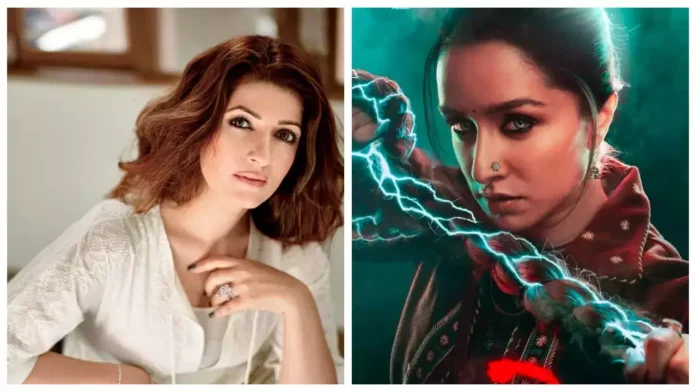Twinkle Khanna has made waves with her recent column praising the film Stree 2, highlighting its blend of social commentary and entertainment. In her latest piece for The Times of India, titled “Why Ghosts Don’t Scare the Indian Stree,” Khanna applauds the film for its unique role reversal and the way it addresses serious issues through its horror-comedy format.
Khanna’s column draws attention to how Stree 2 cleverly flips traditional gender roles, portraying a scenario where women are depicted as empowered and unafraid, while men are the ones who experience fear. This inversion is a refreshing take on the genre, according to Khanna, who praises the film for integrating a meaningful message into its narrative. The film’s plot, which revolves around a supernatural entity known as Stree preying on men who venture out after dark, serves as a metaphor for the real fears women face daily.In her column, Khanna reflects on the significance of this narrative choice, noting that the film’s portrayal of women in control and men in fear highlights the everyday anxieties that women endure. She points out that the true horrors women encounter—such as sexual violence and harassment—are far more disturbing than the fictional ghostly threats depicted in movies. Citing real-life tragedies, such as the rape and murder of a trainee doctor in Kolkata and the sexual abuse of young children in a school in Badlapur, Khanna underscores the film’s role in subverting these fears. The juxtaposition of a ghost story with real-world issues adds depth to the film’s social commentary.Khanna’s praise extends to the film’s execution, particularly how it balances its horror elements with humor and societal critique. She commends director Amar Kaushik for crafting a story that entertains while making a poignant statement about gender dynamics and safety. The film’s ability to engage audiences with both its supernatural elements and its underlying message speaks to its success in addressing relevant issues in a compelling way.The column also touches on the broader implications of Stree 2 and its reflection on societal norms. By presenting a world where the supernatural entity preys on men, the film flips the script on traditional horror narratives, where women are typically the victims. This role reversal not only adds a fresh perspective to the genre but also encourages viewers to consider the daily realities faced by women. Khanna’s observations highlight how the film’s clever storytelling prompts viewers to think critically about gender-based fears and the societal structures that perpetuate them.Khanna’s enthusiasm for the film and its message resonates with readers, offering a thoughtful analysis of how popular media can reflect and challenge societal norms. Her column serves as a reminder of the power of cinema to address important issues while providing entertainment. By celebrating Stree 2 for its innovative approach and its commentary on gender dynamics, Khanna adds to the ongoing conversation about the role of media in shaping and reflecting societal attitudes.
Khanna’s analysis extends beyond just the film’s plot and thematic elements, delving into its impact on audience perceptions and societal attitudes. She argues that Stree 2 effectively challenges traditional gender norms by depicting a scenario where women are depicted as the empowered figures while men are portrayed as vulnerable. This role reversal serves to emphasize the disparity between how fear is experienced by different genders in real life. The film’s portrayal of women reclaiming power through supernatural means acts as a metaphor for the broader struggle for gender equality and safety.
In her column, Khanna also explores how Stree 2 uses humor and satire to address serious issues without diminishing their gravity. By blending comedy with horror, the film manages to engage audiences while prompting them to reflect on societal problems. This approach makes the film’s social message more accessible, allowing viewers to engage with important topics in a manner that is both entertaining and thought-provoking. The humor not only lightens the narrative but also makes the film’s commentary on gender dynamics more relatable.
Khanna’s commentary underscores the importance of media in reflecting and shaping public attitudes. She highlights how Stree 2 contributes to a broader conversation about women’s safety and societal attitudes towards gender-based violence. By presenting a fictional scenario where women have the upper hand, the film encourages viewers to question and reconsider the norms and fears that influence their daily lives. This reflection on societal attitudes aligns with Khanna’s broader critique of how real-life fears often overshadow the fictional horrors portrayed in films.
Additionally, the column discusses the film’s reception and its impact on viewers’ perceptions of gender roles. Khanna notes that Stree 2 has sparked conversations about the representation of women in media and the importance of addressing gender issues through storytelling. The film’s success in engaging audiences and generating dialogue reflects a growing trend in cinema towards incorporating social commentary within popular genres. This shift represents a move towards more nuanced and responsible storytelling that addresses pressing societal issues while entertaining audiences.
Khanna’s praise for Stree 2 also highlights the evolving landscape of Bollywood and its approach to genre films. The integration of social commentary into mainstream cinema signifies a departure from traditional storytelling and an embrace of narratives that address real-world concerns. This evolution in filmmaking reflects a broader cultural shift towards greater awareness and sensitivity regarding gender issues and social justice.
Twinkle Khanna’s column offers a detailed and insightful analysis of Stree 2, celebrating its innovative approach to blending horror, humor, and social commentary. By highlighting the film’s role reversal and its commentary on gender dynamics, Khanna provides a valuable perspective on how cinema can address important societal issues. Her reflections underscore the film’s success in engaging audiences and sparking meaningful conversations about gender and safety, contributing to a more nuanced and responsible approach to storytelling in Bollywood.

